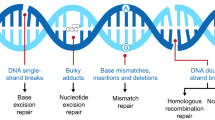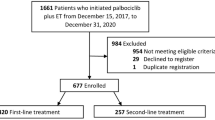Opinion statement
The family of epidermal growth factor receptors (EGFRs) is overexpressed in many gynecologic malignancies. Extensive preclinical studies of these receptors demonstrate that they play an important role in supporting the growth of a wide variety of malignancies and that interruption of receptor function or signaling from these receptors leads to inhibition of tumor growth or in certain cases tumor regression. Recently, many therapeutic agents targeting this receptor have entered the clinic and phase II clinical studies have demonstrated activity in lung cancer, colon cancer, and head and neck malignancies. Phase II trials of both small molecule inhibitors of EGFR and antibody-based inhibitors are underway in both cervical and ovarian cancer and emerging data suggests that their activity in unselected women with advanced gynecologic malignancies is very modest. Recently, molecular analysis of lung cancers has identified that the response to small molecule inhibitors of EGFR is highly correlated with activating mutations within the EGFR. It is possible that these agents will be highly effective in a small subset of patients with gynecologic malignancies whose tumors are dependent on EGFR signaling, perhaps through an activating mutation in EGFR or its downstream pathway. Until additional research can identify the subset of patients most likely to benefit from this targeted therapy, treatment for women with gynecologic malignancies with EGFR inhibitors should be limited to investigational trials. It is critical that these trials have access to tissue of responding and nonresponding patients so to determine the rational use of these agents in the treatment of gynecologic malignancies.
Similar content being viewed by others
References and Recommended Reading
Globocan 2002. http:/www-dep.iarc.fr/globocan/globocan. html. Accessed October 28, 2004.
Wells AL:EGF receptor. Int J Biochem Cell Biol 1999, 31:637–643.
Moscatello DK, Holgado-Madruga M, Godwin AK, et al.:Frequent expression of a mutant epidermal growth factor receptor in multiple human tumors. Cancer Res 1995, 55:5536–5539.
Alper O, Bergmann-Leitner ES, Hacker NF, et al.:Epidermal growth factor receptor signaling and the invasive phenotype in ovarian cancer cells. J Natl Cancer Inst 2001, 93:1375–1384.
Skirnisdottir I, Sorbe B, Seidal T:The growth factors HER-2/neu and EGFR, their relationship, and their effects on the prognosis of early stage epithelial ovarian cancer. Int J Gynecol Cancer 2001, 11:199–129.
Chen Z, Fadiel A, Feng Y, et al.:Ovarian epithelial carcinoma tyrosine phosphorylation, cell proliferation, and ezrin translocation are stimulated by interleukin-1- and epidermal growth factor. Cancer 2001, 142:2776–2788.
Gibson S, Tu S, Oyer R, et al.:Epidermal growth factor protects cells against Fas-induced apoptosis. Requirements for Akt activation. J Biol Chem 1999, 274:17612–17618.
Harlozinska A, Bar JK, Sobanska E, Goluda M:Epidermal growth factor receptor and c-erbB-w oncoproteins in tissue and tumor effusion cells of histopathologically different ovarian neoplasms. Tumour Boil 1998, 19:364–373.
Bookman MA, Darcy KM, Clarke-Pearson D, et al.:Evaluation of monoclonal humanized anti-HER2 antibody, trastuzumab, in patients with recurrent or refractory ovarian or primary peritoneal carcinoma with overexpression of HER2:a phase II trail of the Gynecologic Oncology Group. J Clin Oncol 2003, 21:283–290.
Li L, Zhong YP, Zhang W, et al.:Relationship of expression of c-erbB2, c-erbB3, and c-erbB4 with ovarian carcinoma. Ai Zheng 2004, 23:568–572.
Simpson BJ, Weatherill J, Miller EP, et al.:c-erbB3 protein expression in ovarian tumours. Br J Cancer 1995, 71:758–762.
Gilmor LM, Macleod KG, McCaig A, et al.:Expression of erbB4/HER4 growth factor receptor isoforms in ovarian cancer. Cancer Res 2001, 61:2169–2176.
Chang JL, Tsao YP, Liu DW, et al.:The expression of type I growth factor receptors in the squamous neoplastic changes of uterine cervix. Gynecol Oncol 1999, 73:62–71.
Kersemaekers AM, Fleuren GJ, Kenter GG, et al.:Oncogene alterations in carcinomas of the uterine cervix:overexpression of the epidermal growth factor receptor is associated with poor prognosis. Clin Cancer Res 1999, 5:577–586.
Srinivasan R, Benton F, McCormick F, et al.:Expression of the c-erbBe/HER3 and c-erb4/HER4 growth factor receptors and their ligands, neuregulin-1α, neuregulin- 1 β, betacellulin, in normal endometrium and endometrial cancer. Clin Cancer Res 1999, 5:2877–2883.
Thomas SM, Grandis JR:Pharmacokinetic and pharmacodynamic properties of EGFR inhibitors under clinical investigation. Cancer Treat Rev 2004, 30:225–268. This is an excellent review of the various properties of EGFR inhibitors on a molecular level.
Perez-Soler R:Can rash associated with HER1/EGFR inhibition be used as a marker for treatment outcome? Oncology 2003, 17:23–28.
Swaisland H, Laight A, Stafford L, et al.:Pharmacokinetics and tolerability of the orally active selective epidermal growth factor receptor tyrosine kinases inhibitor ZD 1839 in healthy volunteers. Clin Pharmacokinet 2001, 40:297–306.
Baselga J, Rischin D, Ranson M, et al.:Phase I safety, pharmacokinetic, and pharmacodynamic trial of ZD 1839, a selective oral epidermal growth factor receptor tyrosine kinase inhibitor, in patients with five selected tumor types. J Clin Oncol 2002, 20:4292–4302.
Herbst RS, Maddox AM, Rothenberg ML, et al.:Selective oral epidermal growth factor receptor tyrosine kinase inhibitor ZD 1389 is generally well tolerated and has activity in non-small cell lung cancer and other solid tumors:results of phase I trial. J Clin Oncol 2002, 20:3815–3825.
Ranson M, Hammond LA, Ferry D, et al.:ZD 1389, a selective oral epidermal growth factor receptortyrosine kinase inhibitor, is well tolerated and active in patients with solid, malignant tumors:results of a phase I trial. J Clin Oncol 2002, 20:2240–2250.
Nakagawa K, Tamura T, Negoro S, et al.:Phase I pharmacokinetic trial of the selective oral epidermal growth factor receptor tyrosine kinase inhibitor gefitinib in Japanese patients with solid tumors. Ann Oncol 2003, 14:922–930.
Schilder RJ, Kohn E, Sill MW, et al.:Phase II trial of gefitinib in patients with recurrent ovarian or primary peritoneal cancer:Gynecologic Oncology Group 170C [abstract]. Proc ASCO 2003, 22:451. Although still only in abstract form, this is one of the only trials to evaluate gefitinib as a single agent in ovarian cancer.
Mavroudis D, Efstathiou E, Polyzos A, et al.:Phase I to II trial of gefitinib in combination with vinorelbine and oxaliplatin as salvage therapy in women with advanced ovarian cancer [abstract]. Proc ASCO 2004, 22:14.
Viens P, Lhomme C, Extra JM, et al.:A phase II trial to evaluate efficacy and safety of gefitinib in patients with loco-regionally advanced or metastatic squamous-cell carcinoma of the cervix [abstract]. Proc ASCO 2003, 22:456.
Giaccone G, Scagliotti GV, Manegold C, et al.:Results of a multivariate analysis of prognostic factors of overall survival of patients with advanced NSCLC treated with gefitinib in combination with platinum-based chemotherapy in two large phase III trials (INTACT 1 and2) [abstract]. Proc ASCO 2003, 22:627.
Lynch TJ, Bell DW, Sordella R, et al.:Activating mutations in the epidermal growth factor receptor underlying responsiveness of non-small cell lung cancer to gefitinib. N Eng J Med 2004, 350:2129–2139. This study demonstrates an excellent research effort identifying a specific mutation in the EGFR gene that leads to increased susceptibility to gefitinib. Once a diagnostic test for detecting this mutation becomes available, a subset of patients may be able to be selected who will most likely have a significant response to EGFR inhibitors.
Paez JG, Janne PA, Lee JC, et al.:Epidermal growth factor receptor mutations in lung cancer:correlation with clinical response to gefitinib therapy. Science 2000, 304:1497–1500.
All LF, Cerna C, Gomez L, et al.:Investigation of the effects of CP-358,774 (OSI0774) on various human tumor specimens taken directly from patients [abstract]. Proceedings of the 11th NCI-EORTC-AACR Symposium on New Drugs in Cancer Therapy. Amsterdam, Netherlands; November 7–10, 2000.
Pollack VA, Savage DM, Baker DA, et al.:Inhibition of EGFR-associated tyrosine phosphorylation in human carcinomas with CP-358,774. J Pharmacol Exp Ther 1999, 291:739–748.
Hidalgo M, Sui LL, Nemunaitis J, et al.:Phase I and pharmacokinetic study of OSI-774, an epidermal growth factor receptor tyrosine kinase inhibitor, in patients with advanced solid malignancies. J Clin Oncol 2001, 19:3267–3279.
Karp DD, Silberman R, Csudae R, et al.:Phase I dose escalation study of epidermal growth factor receptor (EGFR) tyrosine kinase (TK) inhibitor CP-358,774 in patients with advanced solid tumors [abstract]. Proc ASCO 1999, 18:388.
Finkler N, Gordon A, Crozier M, et al.:Phase II evaluation of OSI-774, a potent oral antagonist of the EGFRTK in patients with advanced ovarian carcinoma [abstract]. Proc ASCO 2001.
Shepherd FA, Pereira J, Ciuleanu TE, et al.:A randomized placebo-controlled trial of erlotinib in patients with advanced non-small cell lung cancer (NSCLC) following failure of 1st line or 2nd line chemotherapy. A National Cancer Institute of Canada Clinical Trials Group (NCIC CTG) trial [Abstract]. Proc ASCO 2004.
Vasey P, Kaye S, Paul J, et al.:A phase IB trial of erlotinib in combination with docetaxel and carboplatin in untreated ovarian, fallopian tube and primary peritoneal cancers [abstract]. Proc ASCO, 2004.
Shin DM, Nemunaitis J, Zinner RG, el al.:A phase I clinical and biomarker study of CI-1033, a novel pan-ErbB tyrosine kinase inhibitor in patients with solid tumors [abstract]. Proc ASCO 2001.
Campos SM, Seiden MV, Oza A, et al.:A phase II, single-agent study of CI-1033 administered at two doses in ovarian cancer patients who failed platinum therapy [abstract]. Proc ASCO 2004.
Burris HA, Taylor C, Jones S, et al.:A phase I study of GW562016 in patients with solid tumors. Proc Am Soc Clin Oncol 2003, 22:258.
Spector N, Raefsky E, Hurwitz H, et al.:Safety, clinical efficacy, and biologic assessments from EGF10004:a randomized phase IB study of GW572016 for patients with metastatic carcinomas overexpressing EGFR or erbB2. Proc Am Soc Clin Oncol 2003, 22:193.
Burtness BA, Li Y, Flood W, et al.:Phase III trial comparing cisplatin + placebo to cisplatin + anti-epidermal growth factor antibody C225 in patients with metastatic/ recurrent head and neck cancer [abstract]. Proc ASCO 2002.
Vanhoefer U, Tewes M, Rojo F, et al.:Phase I study of the humanized antiepidermal growth factor receptor monoclonal antibody EMD72000 in patients with advanced solid tumors that express the epidermal growth factor resptor. J Clin Oncol 2004, 22:175–184.
Yang XD, Jia XC, Corvalan JR, et al.:Development of ABX-EGF, a fully human anti-EGF receptor monoclonal antibody, for cancer therapy. Crit Rev Oncol Hematol 2001, 38:17–23.
Rowinsky EK, Schwartz GH, Gollob JA, et al.:Safety, pharmacokinetics, and activity of ABX-EGF, a fully human anti-epidermal growth factor receptor monoclonal antibody in patients with metastatic renal cell cancer. J Clin Oncol 2004, 22:3003–3015.
Laux I, Jain A, Tindell CA, et al.:Epidermal growth factor receptor dimerization status determines response to HER-kinase targeted therapies in keratinocytes [abstract]. Proc ASCO 2004, 22:3062.
Blackledge G, Averbuch S:Gefitinib and new epidermal growth factor receptor inhibitors. Brit J Canc 2004, 90:566–572. An excellent review of the newest EGFR inhibitors and their function in various malignancies.
Author information
Authors and Affiliations
Rights and permissions
About this article
Cite this article
Vaidya, A.P., Parnes, A.D. & Seiden, M.V. Rationale and clinical experience with epidermal growth factor receptor inhibitors in gynecologic malignancies. Curr. Treat. Options in Oncol. 6, 103–114 (2005). https://doi.org/10.1007/s11864-005-0018-x
Issue Date:
DOI: https://doi.org/10.1007/s11864-005-0018-x




